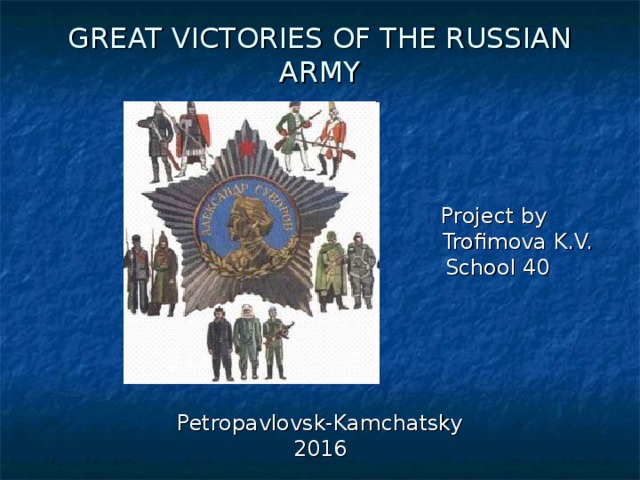
GREAT VICTORIES OF THE RUSSIAN ARMY
Project by
Trofimova K.V.
School 40
Petropavlovsk-Kamchatsky
201 6
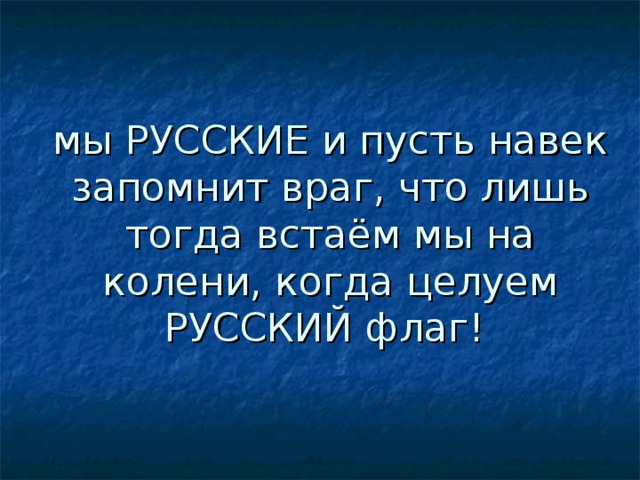
мы РУССКИЕ и пусть навек запомнит враг, что лишь тогда встаём мы на колени, когда целуем РУССКИЙ флаг!
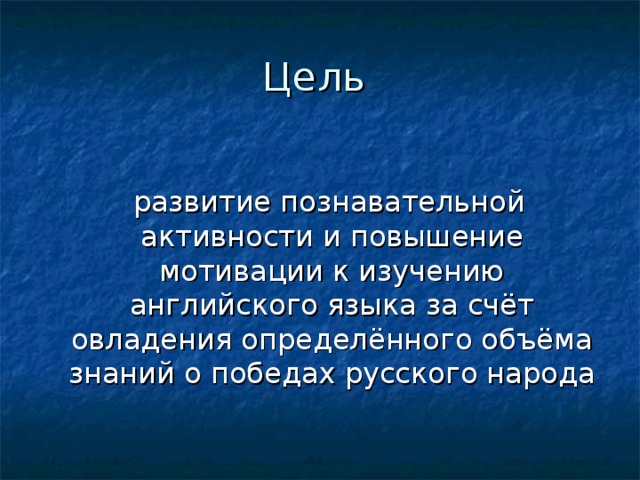
Цель
развитие познавательной активности и повышение мотивации к изучению английского языка за счёт овладения определённого объёма знаний о победах русского народа
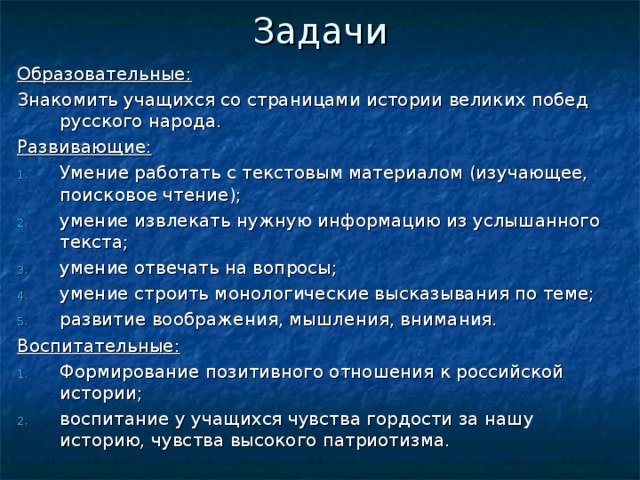
Задачи
Образовательные:
Знакомить учащихся со страницами истории великих побед русского народа.
Развивающие:
- Умение работать с текстовым материалом (изучающее, поисковое чтение);
- умение извлекать нужную информацию из услышанного текста;
- умение отвечать на вопросы;
- умение строить монологические высказывания по теме;
- развитие воображения, мышления, внимания.
Воспитательные:
- Формирование позитивного отношения к российской истории;
- воспитание у учащихся чувства гордости за нашу историю, чувства высокого патриотизма.
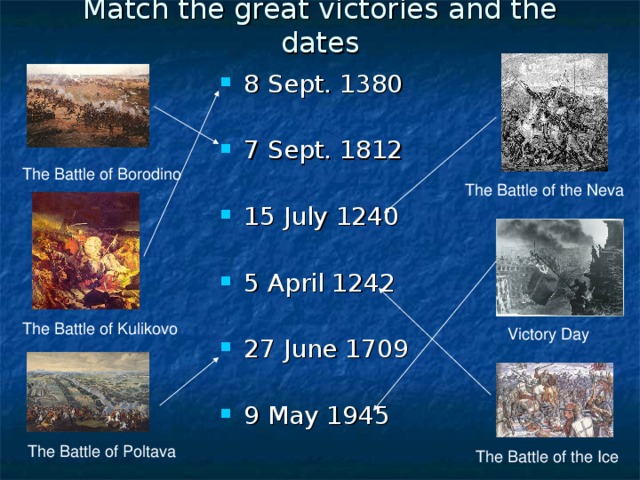
Match the great victories and the dates
The Battle of Borodino
The Battle of the Neva
The Battle of Kulikovo
Victory Day
The Battle of Poltava
The Battle of the Ice
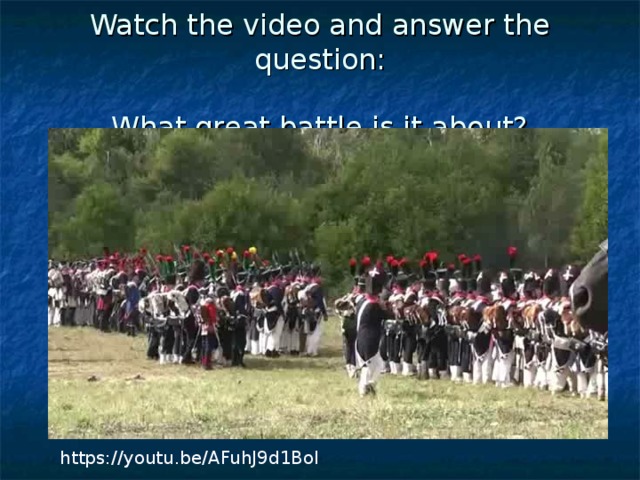
Watch the video and answer the question: What great battle is it about?
https://youtu.be/AFuhJ9d1BoI
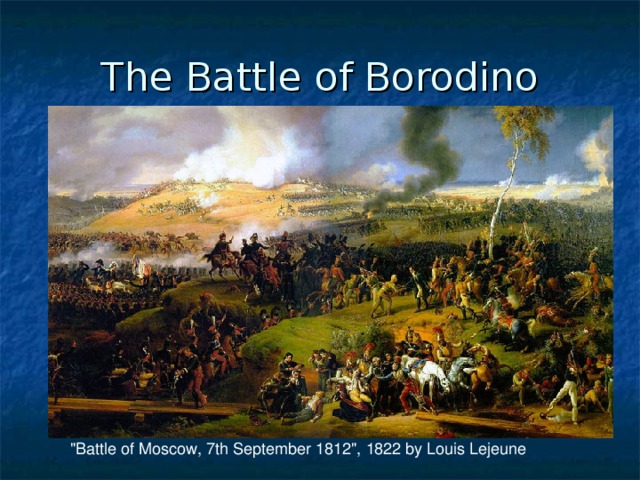
The Battle of Borodino
"Battle of Moscow, 7th September 1812", 1822 by Louis Lejeune
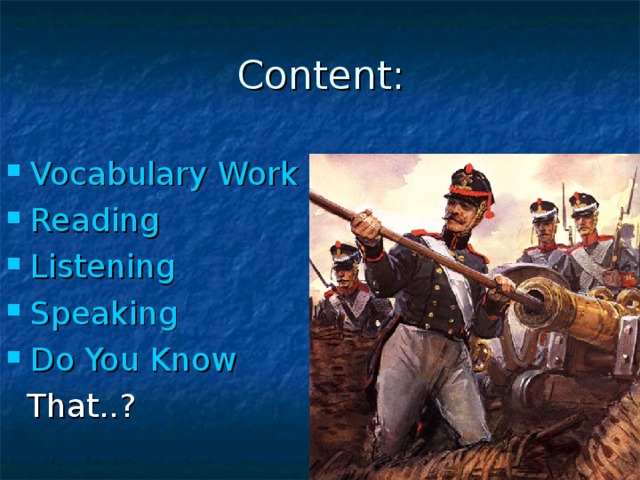
Content:
- Vocabulary Work
- Reading
- Listening
- Speaking
- Do You Know
That..?
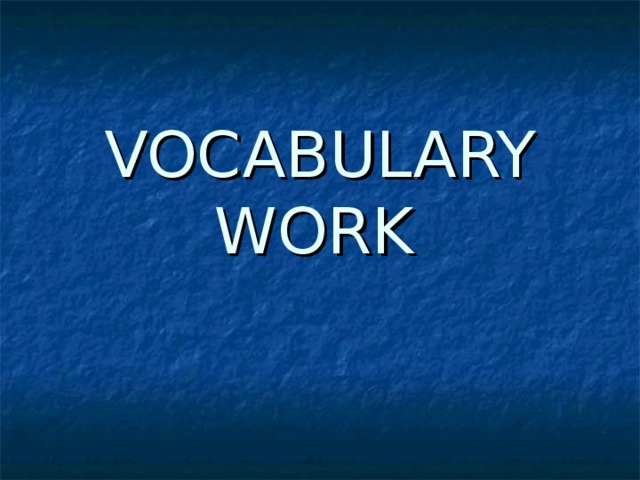
VOCABULARY WORK
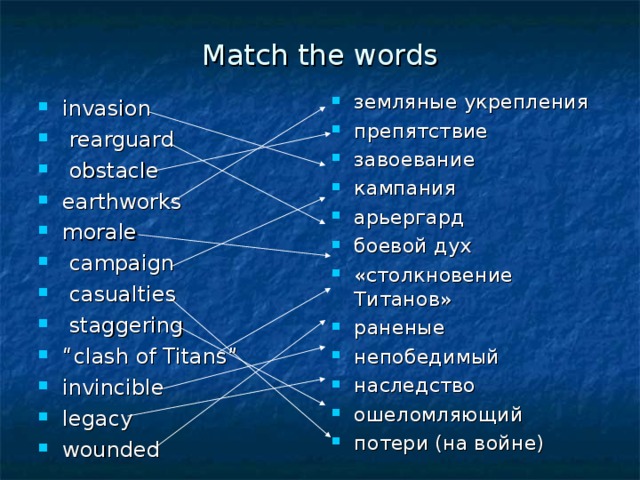
Match the words
- земляные укрепления
- препятствие
- завоевание
- кампания
- арьергард
- боевой дух
- «столкновение Титанов»
- раненые
- непобедимый
- наследство
- ошеломляющий
- потери (на войне)
- invasion
- rearguard
- obstacle
- earthworks
- morale
- campaign
- casualties
- staggering
- “ clash of Titans”
- invincible
- legacy
- wounded
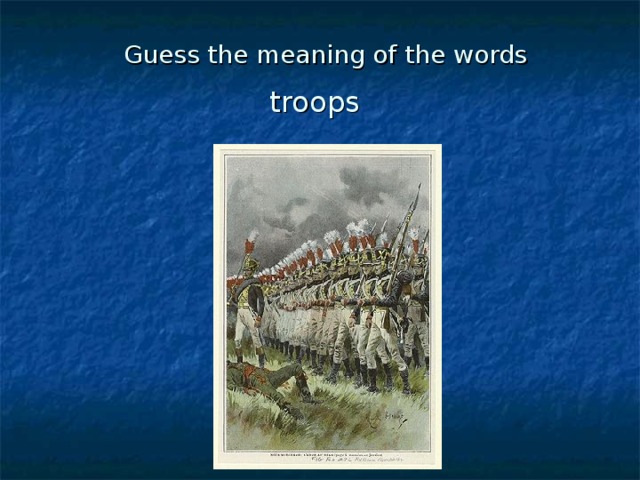
Guess the meaning of the words
troops
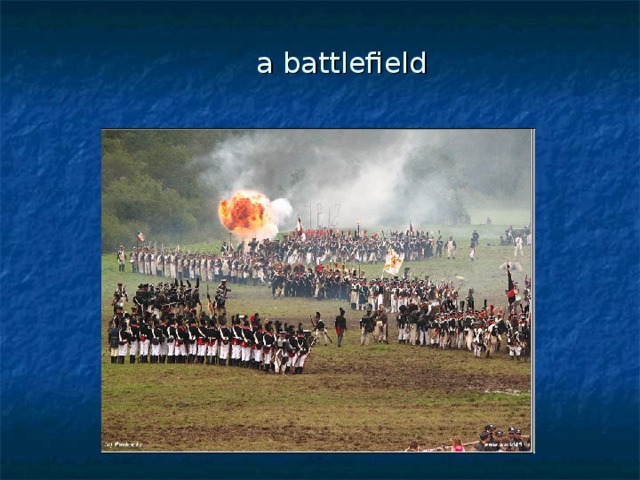
a battlefield
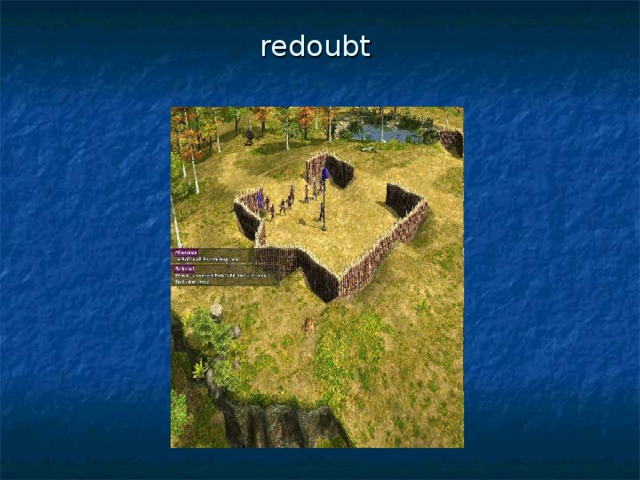
redoubt
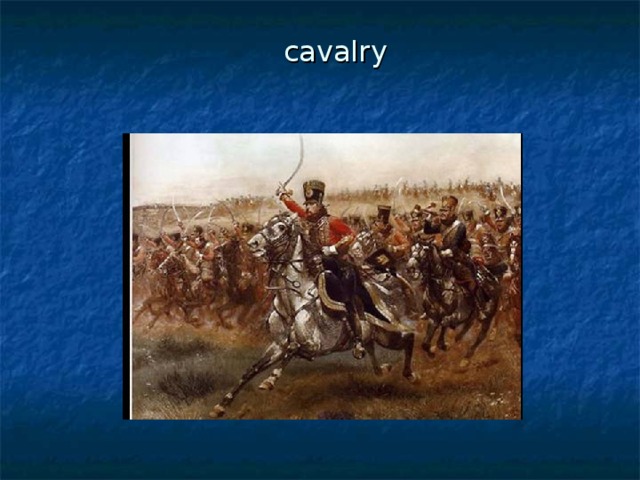
cavalry
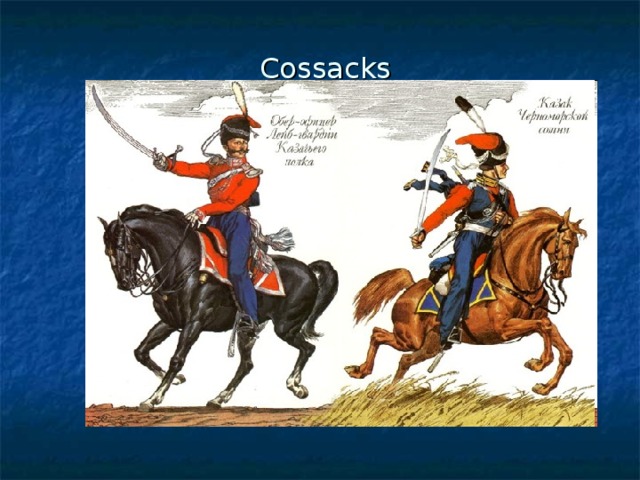
Cossacks
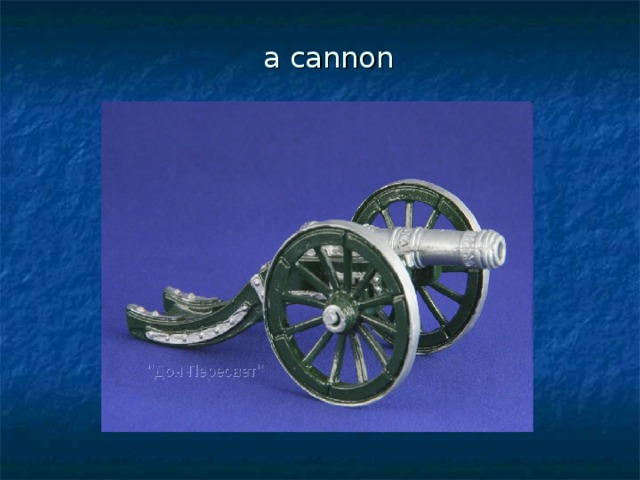
a cannon
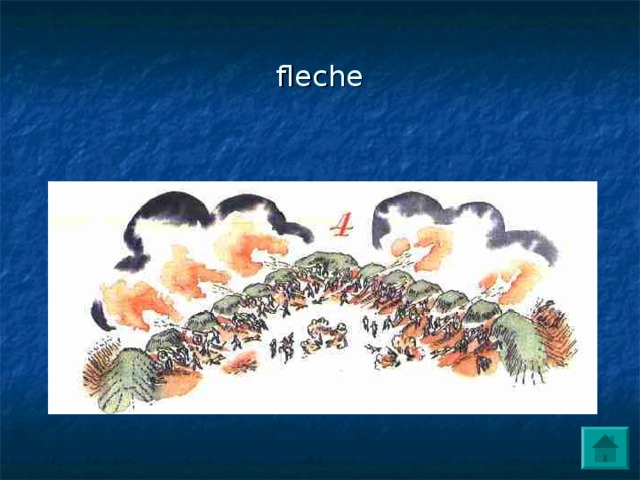
fleche
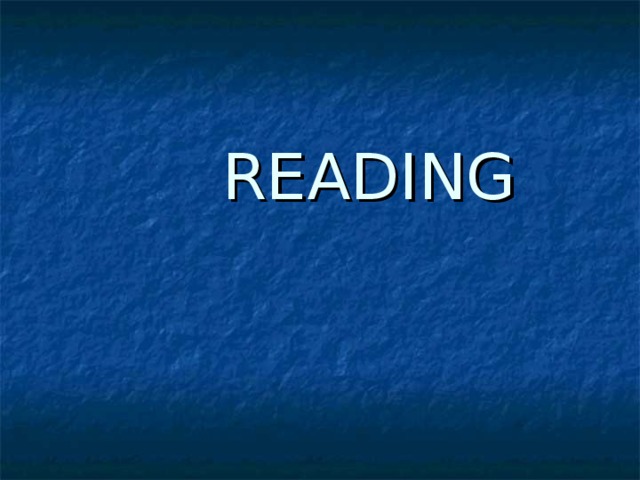
READING
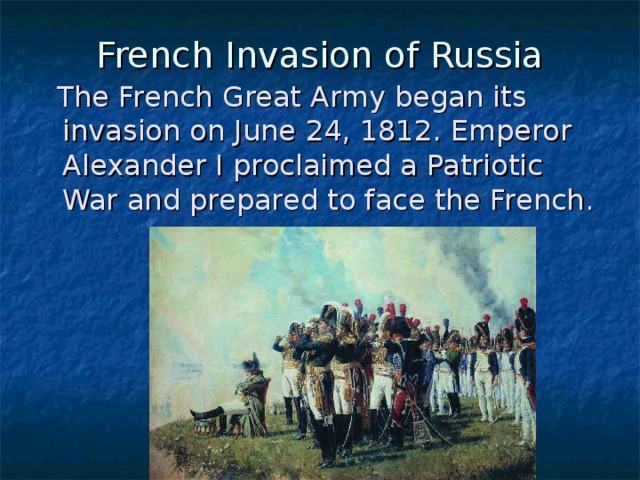
French Invasion of Russia
The French Great Army began its invasion on June 24 , 1812. Emperor Alexander I proclaimed a Patriotic War and prepared to face the French.
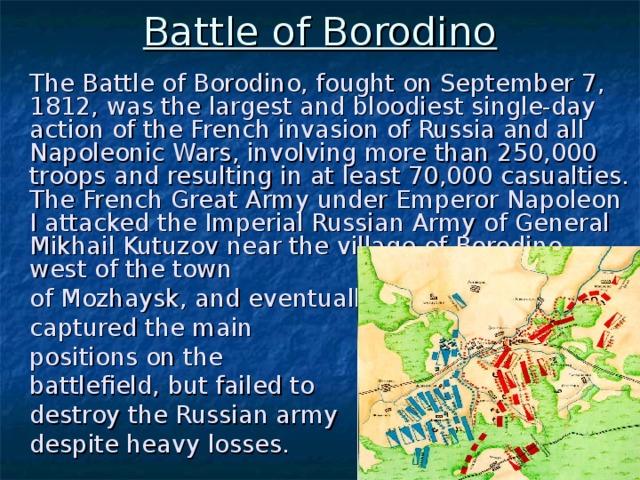
Battle of Borodino
The Battle of Borodino, fought on September 7, 1812, was the largest and bloodiest single-day action of the French invasion of Russia and all Napoleonic Wars, involving more than 250,000 troops and resulting in at least 70,000 casualties. The French Great Army under Emperor Napoleon I attacked the Imperial Russian Army of General Mikhail Kutuzov near the village of Borodino, west of the town
of Mozhaysk, and eventually
captured the main
positions on the
battlefield, but failed to
destroy the Russian army
despite heavy losses.
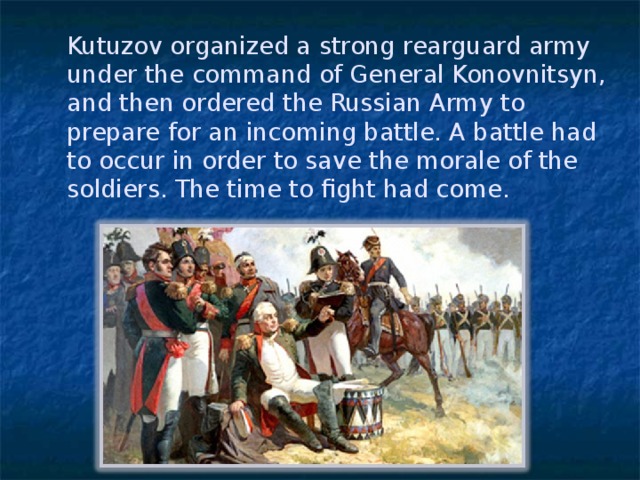
Kutuzov organized a strong rearguard army under the command of General Konovnitsyn, and then ordered the Russian Army to prepare for an incoming battle. A battle had to occur in order to save the morale of the soldiers. The time to fight had come.
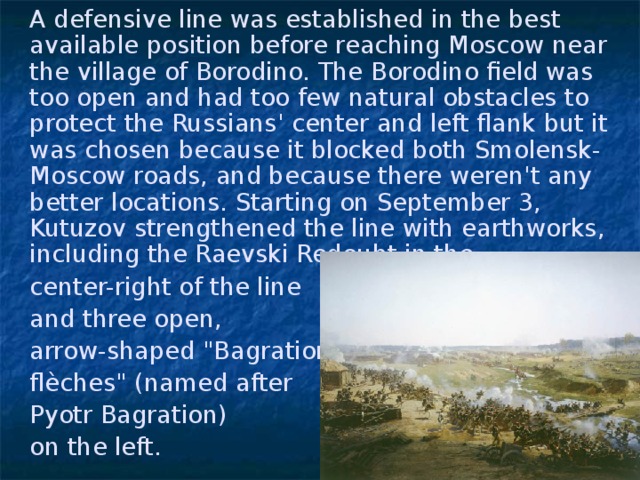
A defensive line was established in the best available position before reaching Moscow near the village of Borodino. The Borodino field was too open and had too few natural obstacles to protect the Russians' center and left flank but it was chosen because it blocked both Smolensk-Moscow roads, and because there weren't any better locations. Starting on September 3, Kutuzov strengthened the line with earthworks, including the Raevski Redoubt in the
center-right of the line
and three open,
arrow-shaped "Bagration
flèches" (named after
Pyotr Bagration)
on the left.
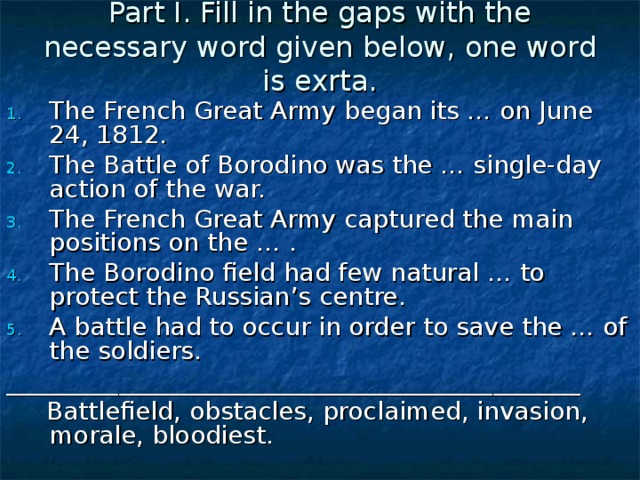
Part I. Fill in the gaps with the necessary word given below, one word is exrta.
- The French Great Army began its … on June 24, 1812.
- The Battle of Borodino was the … single-day action of the war.
- The French Great Army captured the main positions on the … .
- The Borodino field had few natural … to protect the Russian’s centre.
- A battle had to occur in order to save the … of the soldiers.
______________________________________________
Battlefield, obstacles, proclaimed, invasion, morale, bloodiest.
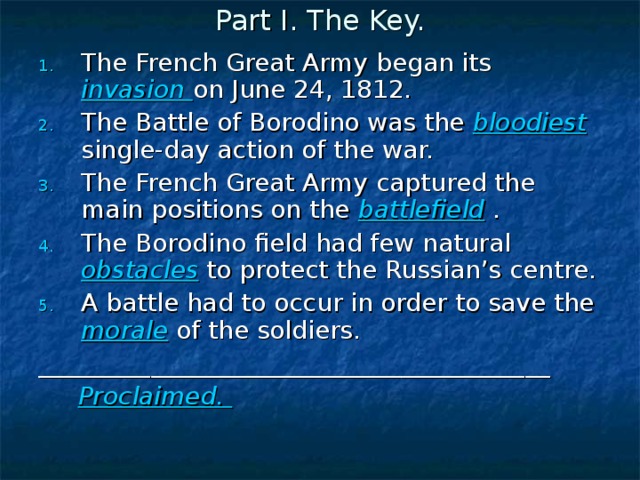
Part I. The Key.
- The French Great Army began its invasion on June 24, 1812.
- The Battle of Borodino was the bloodiest single-day action of the war.
- The French Great Army captured the main positions on the battlefield .
- The Borodino field had few natural obstacles to protect the Russian’s centre.
- A battle had to occur in order to save the morale of the soldiers.
_________________________________________
Proclaimed.
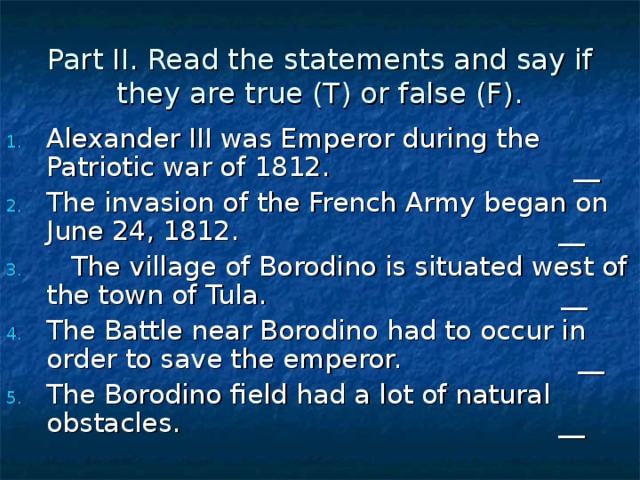
Part II. Read the statements and say if they are true (T) or false (F).
- Alexander III was Emperor during the Patriotic war of 1812. __
- The invasion of the French Army began on June 24 , 1812. __
- The village of Borodino is situated west of the town of Tula. __
- The Battle near Borodino had to occur in order to save the emperor. __
- The Borodino field had a lot of natural obstacles. __
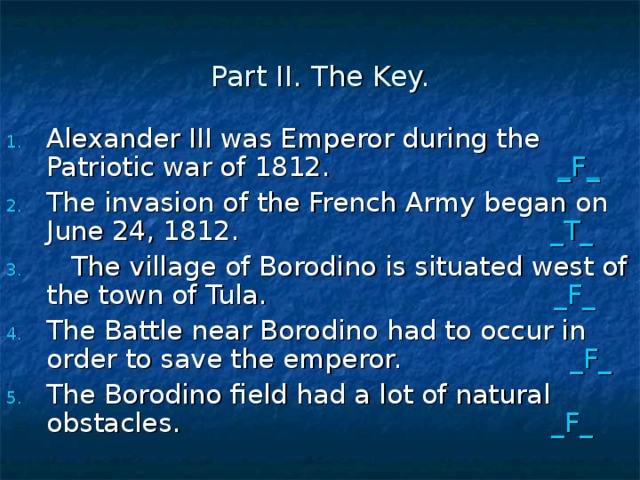
Part II. The Key.
- Alexander III was Emperor during the Patriotic war of 1812. _ F _
- The invasion of the French Army began on June 24, 1812. _T_
- The village of Borodino is situated west of the town of Tula. _F_
- The Battle near Borodino had to occur in order to save the emperor. _F_
- The Borodino field had a lot of natural obstacles. _F_
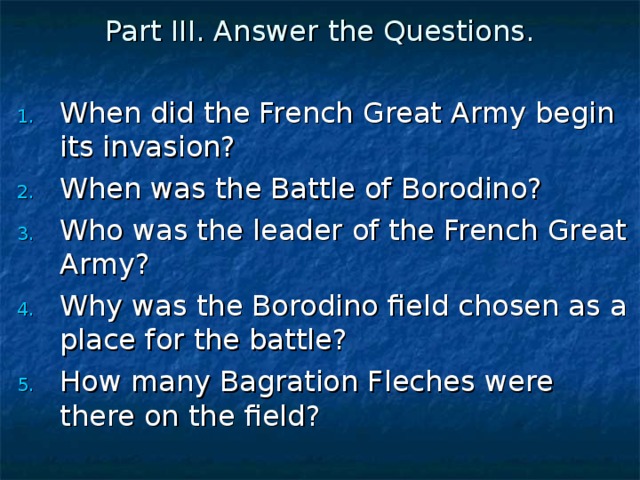
Part III. Answer the Questions.
- When did the French Great Army begin its invasion?
- When was the Battle of Borodino?
- Who was the leader of the French Great Army?
- Why was the Borodino field chosen as a place for the battle?
- How many Bagration Fleches were there on the field?
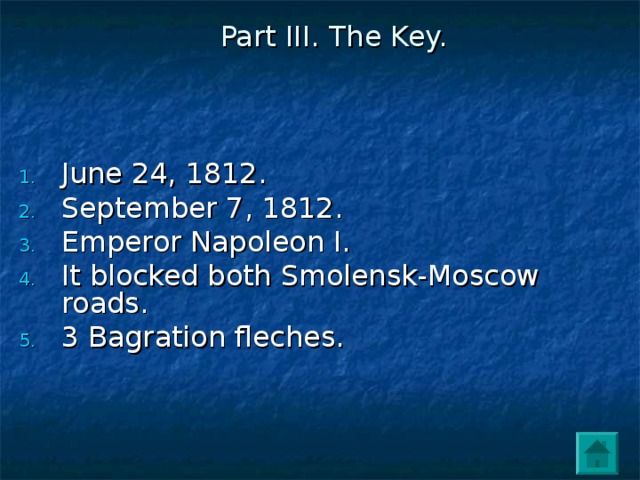
Part III. The Key.
- June 24, 1812.
- September 7, 1812.
- Emperor Napoleon I.
- It blocked both Smolensk-Moscow roads.
- 3 Bagration fleches.

Listening
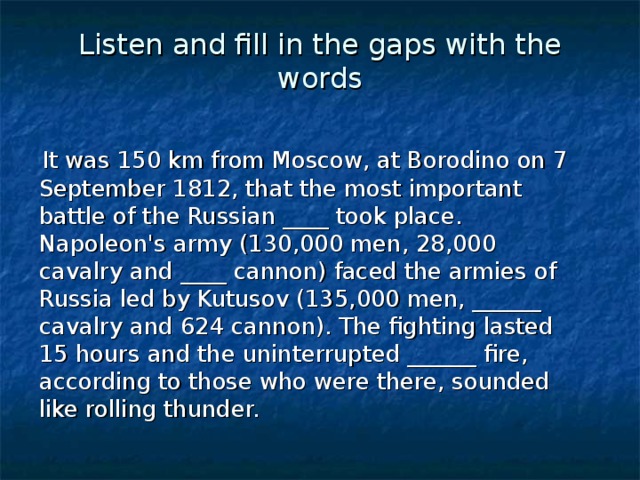
Listen and fill in the gaps with the words
It was 150 km from Moscow, at Borodino on 7 September 1812, that the most important battle of the Russian ____ took place. Napoleon's army (130,000 men, 28,000 cavalry and ____ cannon) faced the armies of Russia led by Kutusov (135,000 men, ______ cavalry and 624 cannon). The fighting lasted 15 hours and the uninterrupted ______ fire, according to those who were there, sounded like rolling thunder.
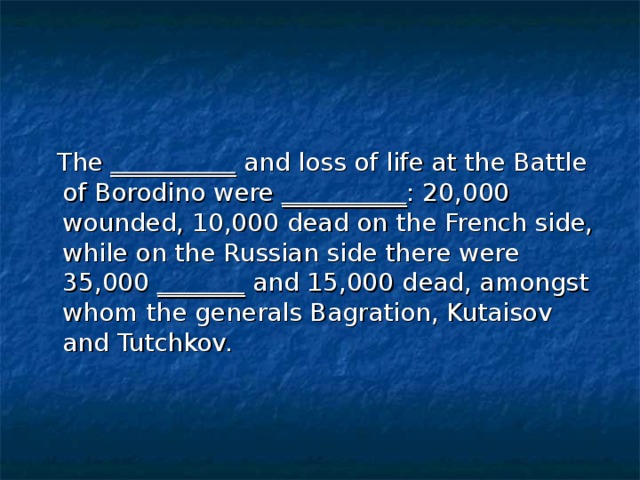
The __________ and loss of life at the Battle of Borodino were __________ : 20,000 wounded, 10,000 dead on the French side, while on the Russian side there were 35,000 _______ and 15,000 dead, amongst whom the generals Bagration, Kutaisov and Tutchkov.
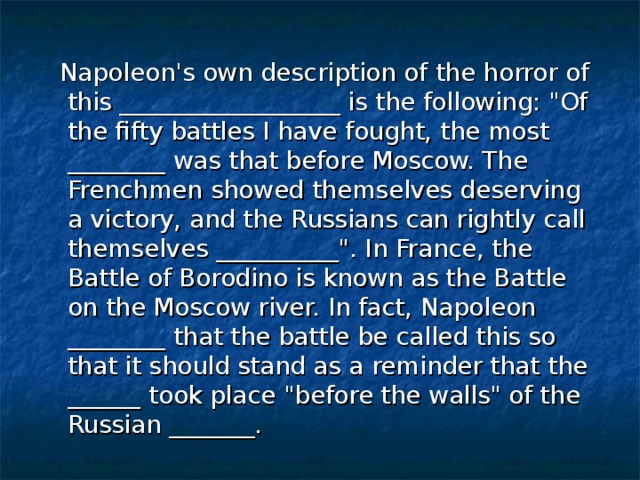
Napoleon's own description of the horror of this __________________ is the following: "Of the fifty battles I have fought, the most ________ was that before Moscow. The Frenchmen showed themselves deserving a victory, and the Russians can rightly call themselves __________". In France, the Battle of Borodino is known as the Battle on the Moscow river. In fact, Napoleon ________ that the battle be called this so that it should stand as a reminder that the ______ took place "before the walls" of the Russian _______.
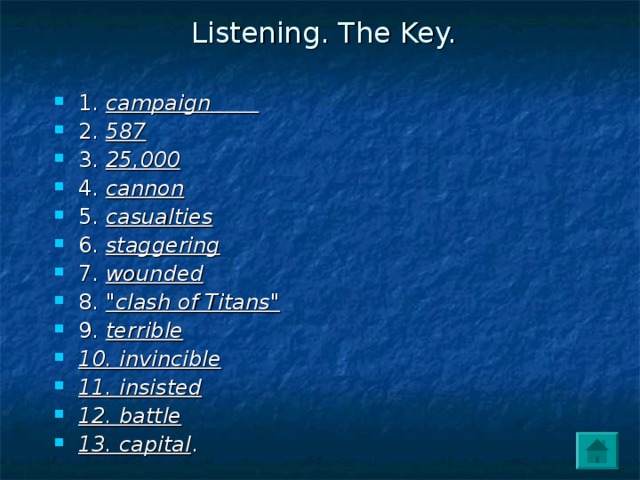
Listening. The Key.
- 1. campaign
- 2. 587
- 3. 25,000
- 4. cannon
- 5. casualties
- 6. staggering
- 7. wounded
- 8. "clash of Titans"
- 9. terrible
- 10. invincible
- 11. insisted
- 12. battle
- 13. capital .
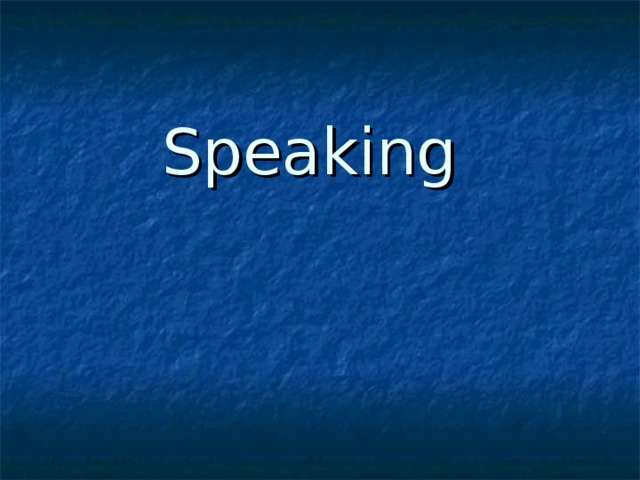
Speaking
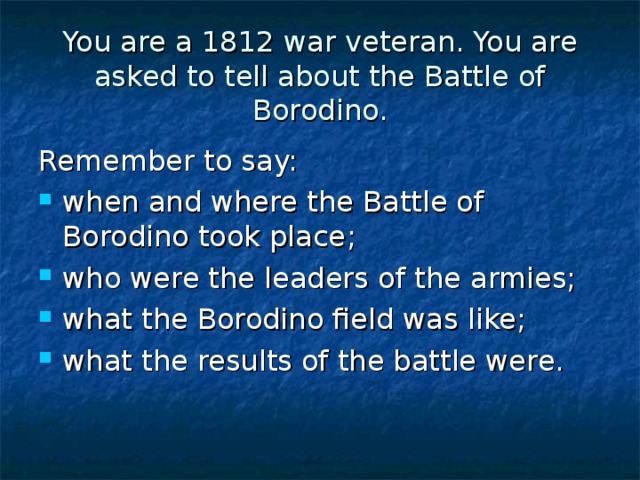
You are a 1812 war veteran. You are asked to tell about the Battle of Borodino.
Remember to say:
- when and where the Battle of Borodino took place ;
- who were the leaders of the armies;
- what the Borodino field was like;
- what the results of the battle were.
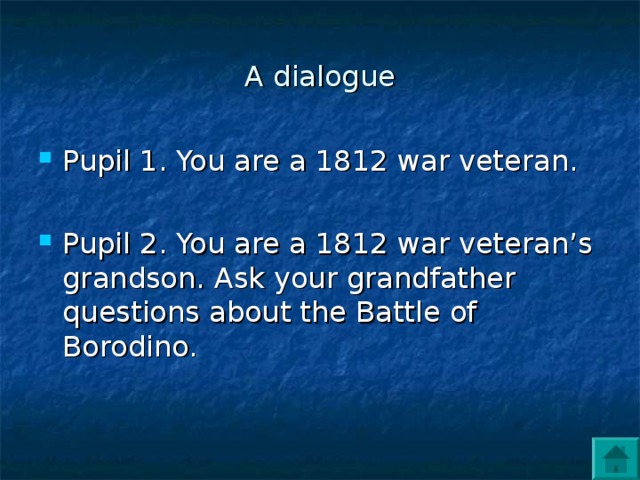
A dialogue
- Pupil 1. You are a 1812 war veteran.
- Pupil 2. You are a 1812 war veteran’s grandson. Ask your grandfather questions about the Battle of Borodino.
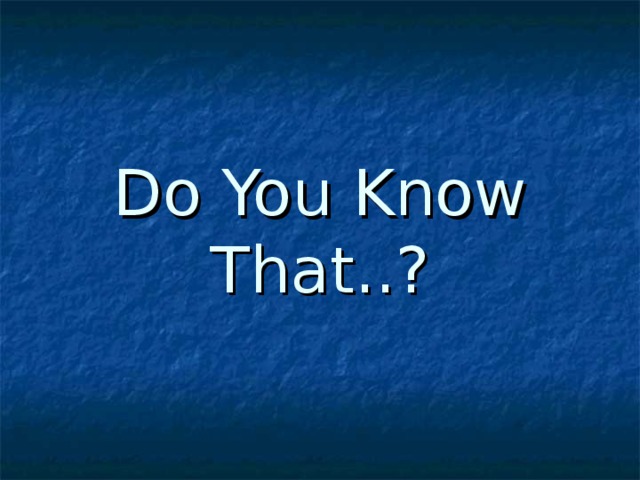
Do You Know That..?
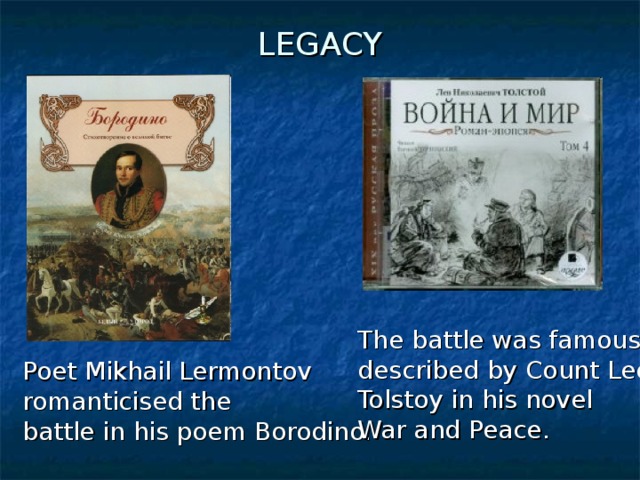
LEGACY
The battle was famously
described by Count Leo
Tolstoy in his novel
War and Peace.
Poet Mikhail Lermontov
romanticised the
battle in his poem Borodino.
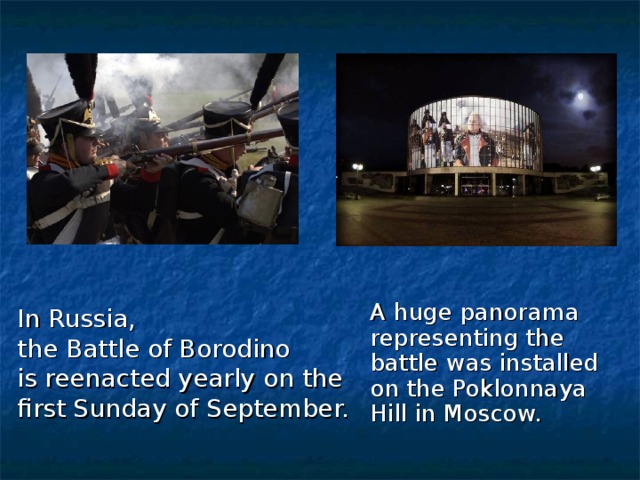
A huge panorama representing the battle was installed on the Poklonnaya Hill in Moscow.
In Russia,
the Battle of Borodino
is reenacted yearly on the
first Sunday of September.
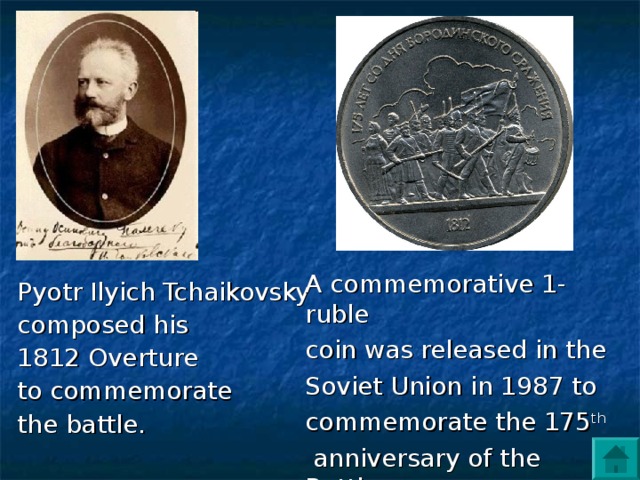
A commemorative 1-ruble
coin was released in the
Soviet Union in 1987 to
commemorate the 175 th
anniversary of the Battle
of Borodino.
Pyotr Ilyich Tchaikovsky
composed his
1812 Overture
to commemorate
the battle.

A minor planet 3544 Borodino, discovered by Soviet astronomer Nikolai Stepanovich Chernykh in 1977 was named after the village Borodino.
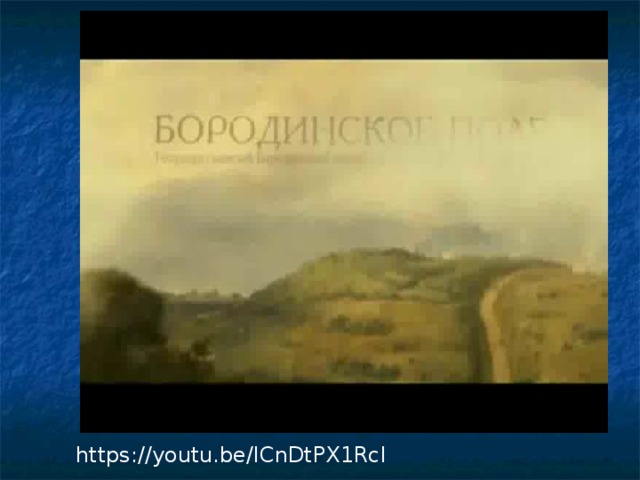
https://youtu.be/lCnDtPX1RcI
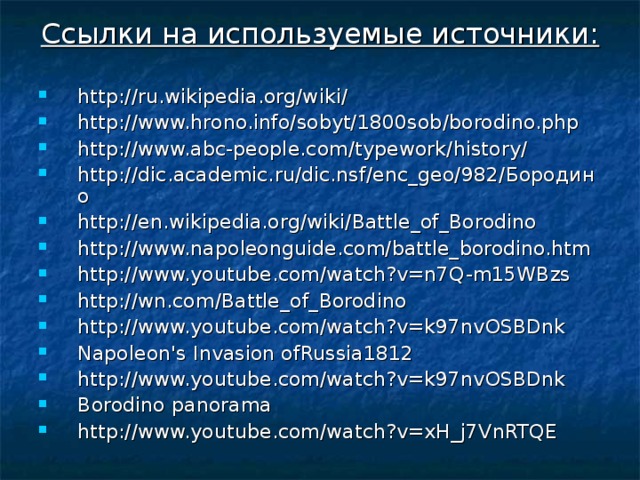
Ссылки на используемые источники:
- http://ru.wikipedia.org/wiki/
- http://www.hrono.info/sobyt/1800sob/borodino.php
- http://www.abc-people.com/typework/history/
- http://dic.academic.ru/dic.nsf/enc_geo/982/Бородино
- http://en.wikipedia.org/wiki/Battle_of_Borodino
- http://www.napoleonguide.com/battle_borodino.htm
- http://www.youtube.com/watch?v=n7Q-m15WBzs
- http://wn.com/Battle_of_Borodino
- http://www.youtube.com/watch?v=k97nvOSBDnk
- Napoleon's Invasion ofRussia1812
- http://www.youtube.com/watch?v=k97nvOSBDnk
- B orodino panorama
- http://www.youtube.com/watch?v=xH_j7VnRTQE


























































